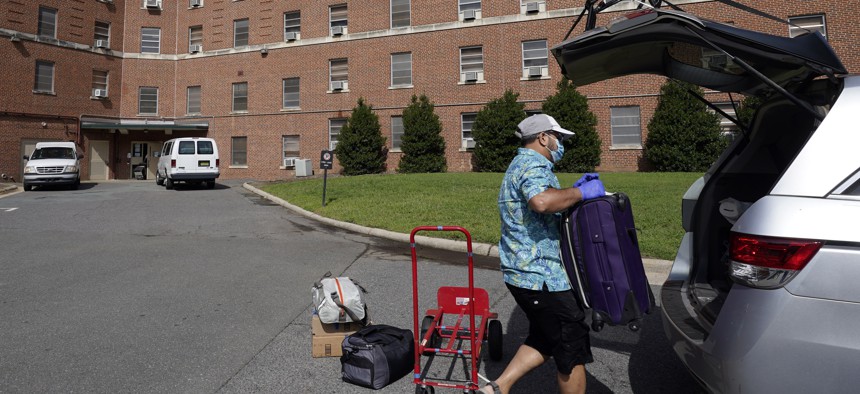Universities Suspend Students, Bust Parties to Enforce Covid-19 Rules

A parent packs a student's belongings at Ehringhaus dormitory following a cluster of COVID-19 cases on campus at the University of North Carolina in Chapel Hill, N.C., Tuesday, Aug. 18, 2020. AP Photo/Gerry Broome
Some universities are reconsidering their decisions to hold in-person classes amid the coronavirus pandemic while others are cracking down on student life.
It used to be underage drinking was the problem. But as colleges have welcomed students back to campus for the fall semester, they are now policing parties for face masks and social distancing in an effort to prevent coronavirus outbreaks.
The University of Connecticut is one of several schools this week to evict students from on-campus housing after violations of campus coronavirus guidelines were reported. The university made the announcement this week after a video surfaced showing a crowded dorm party at which students weren’t following the precautions.
“Students were not wearing masks, closely assembled, and endangering not only their own health and wellbeing, but that of others at a time when UConn is working to protect our community and resume classes in the context of a deadly global pandemic,” wrote Eleanor Daugherty, associate vice president and dean of students, and Pamela Schipani, executive director of residential life, in a letter to students.
Students began returning to campus on Friday and were asked by the university to limit contact with others during their first two weeks back. All received coronavirus tests before moving in and of the more than 5,200 students tested, 12 tested positive for Covid-19 as of Thursday.
Other schools have taken similar action over large gatherings.
Drake University in Iowa suspended 14 students from on-campus housing for two weeks after officials said they violated coronavirus guidelines. And at Purdue University in Indiana, 36 students were suspended after campus police were called to student housing for a noise complaint and found that attendees were not wearing face masks.
At the University of Michigan, the Ann Arbor Police Department announced Thursday that it would conduct “party patrols” to help enforce the university’s ban on large gatherings and to promote public health recommendations. Working in tandem with university police, the patrols would "serve as a visible presence and reminder to students and other community members of the need to follow public health guidance," the department said.
Universities across the country sent students home this spring and transitioned to online classes as the pandemic spread. Some have opted to forego in-person classes this fall, worried universities could become hotspots as students from across the country reunite in dorms and classrooms.
But for schools that opened their doors, coronavirus outbreaks in the first few weeks of class have already caused some to temporarily suspend classes or to send students home.
The University of North Carolina at Chapel Hill suspended in-person classes and switched to all remote learning a week into the fall semester after several clusters of Covid-19 were reported in dorms, apartments and a fraternity house and 130 students tested positive for the virus.
Michigan State University announced Tuesday, just two days before students were set to begin moving back on campus, that it would also cancel in-person classes this semester.
"Given the current status of the virus in our country—particularly what we are seeing at other institutions as they repopulate their campus communities—it has become evident to me that, despite our best efforts and strong planning, it is unlikely we can prevent widespread transmission of COVID-19 between students if our undergraduates return to campus," President Samuel Stanley wrote in a letter to students. "So, effective immediately, we are asking undergraduate students who planned to live in our residence halls this fall to stay home and continue their education with MSU remotely.”
Citing the issues that have cropped up at other schools, an editorial in the student newspaper at the University of Kansas called university officials’ decision to hold in-person classes “too much of a gamble” and urged them to cancel in-person classes.
“A similar story will likely play out at the University of Kansas if it follows through on plans to bring students back to classes in person starting Monday,” said the editorial published in the University Daily Kansan. “If we follow UNC’s lead and then revert to online classes, KU will have an easy scapegoat: its students. But we must resist this narrative and hold the administration accountable for not doing the morally sound thing in a pandemic.”
Andrea Noble is a staff correspondent with Route Fifty.
NEXT STORY: A Town Turns to Analytic Modeling—and Data-Sharing—to Improve Flood Monitoring





